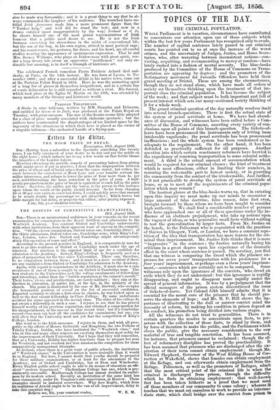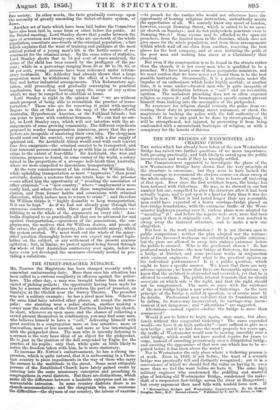TOPICS OF THE DAY.
THE CRIMINAL POPULATION.
WHILE Parliament is in vacation, circumstances have contributed to concentrate our attention upon one of those subjects which within the last few years Parliament has recognized only to evade. The number of capital sentences lately passed in our criminal oourts has pointed out to us at once the increase of the worst crimes, and the uncertainty of Judges, Juries, and Home Secre- taries, who, after wavering between inconsistent notions—con- victing, acquitting, and recommending to mercy at random—have lately rushed into a fashion of mortal severity. The blue-books produced by the Committee of the House of Commons on Trans- portation are appearing by degrees ; and the promoters of the Reformatory movement for Juvenile Offenders have held their grand meeting at Bristol. These are among the circumstances, though they do not stand alone, which have made all orders of society set themselves thinking upon the treatment of that im- portant class the criminal population. It has become the subject of the week ; and that subject must be both important and full of present interest which sets our many-sectioned society thinking of it for a whole week.
The grand criminal question of the day naturally resolves itself into several branch-questions. There is first the actual state of the system of penal servitude at home. We have had abund- ance of discussion, and witnesses have been called before a Com- mittee of the House of Commons, asserting every variety of con- clusions upon all points of this branch-question. The tickets-of- leave have been pronounced the instruments only of letting loose intolerable vagabonds ; the penal servitude has been pronounced inefficacious ; and the whole system has been condemned as in- adequate to the requirement. On the other hand, it has been defended as practically sufficient for all purposes. Another question into which certain reactionary reformers have hurried is
the expediency of renewing transportation to some colonial settle- ment. A third is the actual amount of accommodation which would be required for our criminal classes ; the kind of treatment which is most efficacious, either in limiting their numbers in restoring the redeemable part to honest society, or in guarding the community from the contact of the irredeemable. And further, is it not practicable to develop the system of penal servitude at home, so as to meet all the requirements of the criminal popu- lation which may remain ?
The hastiest glance at the blue-books warns us, that in entering upon this inquiry we must make up our minds to encounter a large amount of false doctrine, false reason, false fact even, brought forward by those whom we have been iaught to consider high authority. We shall find a considerable number of persons who have approached one or all of these questions under the in- fluence of an obstinate prejudgment, who take up notions upon the vaguest of ideas, or who generalize small facts without waiting to test the generalization by larger facts. From Mr. Justice on the bench, to the Policeman who is acquainted with the practices of thieves in Glasgow, York, or London, we have a constant repe- tition of the idea that transportation has more terrors for the cri- minal than imprisonment. Mr. Justice Erle thinks that it is more " impressive " in the sentence ; the Justice naturally basing his criticism in a great degree upon his experience of the dramatic effect in the court where sentence is passed. On scrutiny, you find that one witness is comparing the dread which the prisoner ex- presses for seven years' transportation with his preference for a ,four years' imprisonment, or perhaps even a three years' imprison-, ment,—sentences which are certainly not to be compared. Some witnesses rely upon the ignorance of the convicts, who dread an exile which they do not understand : but this ignorance is rapidly disappearing, and ought to disappear more rapidly under the spread of general information. It was by a prejudgment that the official managers of the prison system discontinued the issue of tickets-of-leave. Yet Colonel Jebb himself admits that it is essential for the moral cure of the prisoner that he should pre- serve the elements of hope ; and Mr. M. D. Hill shows the im- portance of illustrating to the dull or narrow convict mind the necessity of reform, by making his condition in prison depend on his conduct, his promotion being divided into various stages.
All the witnesses do not trust to generalities. There is in certain quarters the resolve to concentrate upon facts, to per- severe with the collection of those facts, to stand by them, and by force of iteration to make the public, and the Parliament which obeys the public, give the necessary consideration to the raw material of true and tangible conviction. It has been assumed, for instance, that prisoners cannot be reclaimed ; though the ef- fect of reformatory discipline has proved the practicability. It has been assumed that prisoners who are discharged after the ex- piration of their term cannot obtain employment ; though Mr. Edward Shepherd, Governor of the West Riding House of Cor- rection at Wakefield, shows that females can obtain employment at the Refuge, and can afterwards obtain employment from the Refuge. Policemen, as well as the promoters offliges admit that the most critical point of the criminal life is when the criminal is discharged from prison, through the difficulty
which he finds in obtaining employment : that well-known fact has been taken hitherto as a proof that we must send off those members of our community to some colony ; whereas it teaches that we must set ourselves to work to provide an interme- diate state, which shall bridge over the convict from prison free society. In other words, the facts gradually converge upon the necessity of greatly amending the ticket-of-leave system, at home.
Another set of facts which have been laid before the Committee have also been laid in some form or other before the public. At the Bristol meeting, Lord Stanley shows that youths between the ages of seventeen and twenty-one, who are one-tenth of the whole population, constitute one-fourth of the criminal population ; a feet which explains that the want of training and guidance at the most critical period of a young man's life is the fertile source of re- cruitment for the criminal army. By the same series of statistics, Lord Stanley shows that in 75 per cent of cases analyzed, the crime of the child has been caused by the profligacy of the pa- rent ; while in a percentage ranging from 50 or 60 to 70, 85, or 89 per cent, young persons have been redeemed under reform- atory treatment. Mr. Adderley had already shown that a large proportion must be withdrawn by the effect of a better educa- tion and better industrial arrangements. This Reformatory agi- tation, still proceeding and gradually converging to practical conclusions, has a close bearing upon the scope of any system which we tinaony be compelled to establish at home. . Lord S ley is right in the opinion that " we are without much prospect of being able to reestablish the practice of trans- portation." Those who are for renewing it point with moving fingers to this or that place on the map of the world—North Australia, Hyperborean America, or the Falkland Islands ; but can point to none with confident firmness. We can find no out- let, as Lord Stanley says, which will not interfere with the ar- rangements of some growing community. The different expedients proposed to render transportation, innoxious, prove that the pro- jectors are incapable of mastering their own idea. The clergymen would send out the convict, very properly, with a due supply of spiritual aid. Sir Archibald Alison would send with each convict four free emigrants—the criminal convict to be transported, and four innocent persons condemned to go with him in order to dilute crime to the extent of four-fifths ! Sir Archibald, the wise and virtuous, proposes to found, in some corner of the world, a colony mixed in the proportions of a stronger hell-broth than Australia, where we were compelled to discontinue transportation ! At the very commencement of his .evidence, Sir William Erie while upholding transportation as more " impressive " than penal desires a sentence that can retain hope to the prisoner —can afford him the opportunity of " avoiding the association of other criminals "—a " new country," where " employment is more easily had, and where there are not those temptations from asso- ciation, and from former habits and connexions with criminal characters, which induce men to return to crime" ; and therefore Sir William thinks it " highly desirable to keep transportation, if it can be kept." As if we had not already gone through that enormous controversy, with three great English colonies ex- hibiting to us the whole of the arguments on every side Aus- tralia displayed to us practically all that can be advanced for and against transportation,—specimens of the associations, the em- ployments, the motives that Sir William desires, and proofs of the crime, the guilt, the depravity, the unutterable misery, which the system created. We must work out the whole of the many- sided question thoroughly before we can expect any sound legis- lation on the subject, or any settlement of the present anxious agitation ; but, in ))mine, we protest against being forced through the whole of that Australian controversy over again, before we have even yet developed the measures obviously needed in pro- viding a substitute.



























 Previous page
Previous page